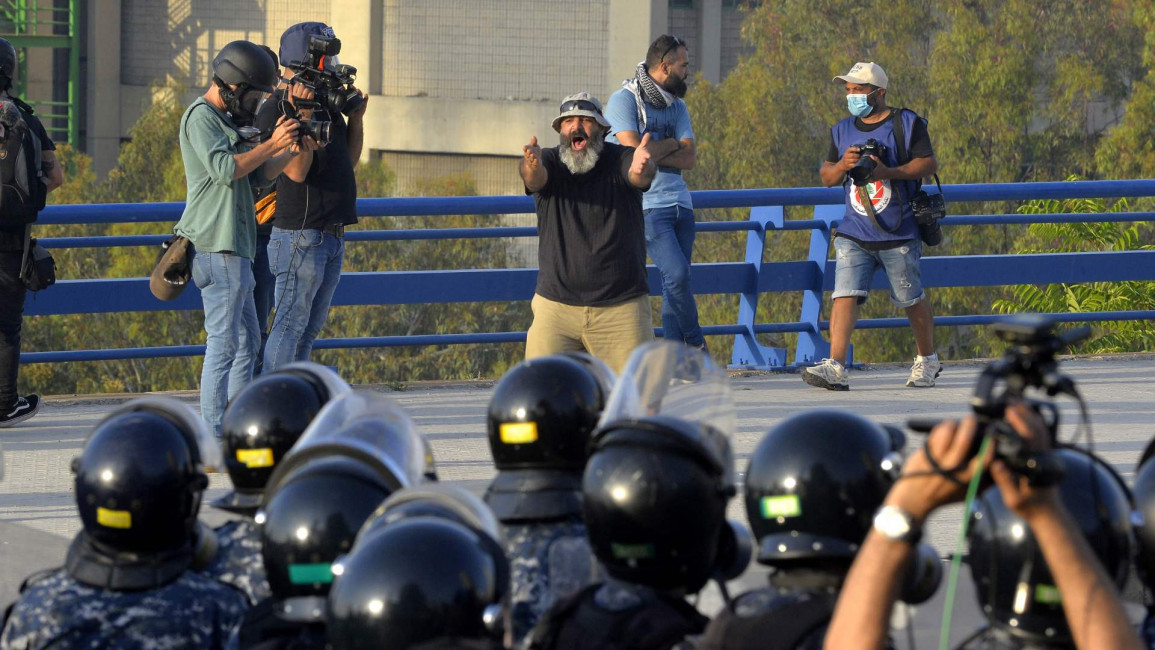Lebanese protesters demand independent judiciary, amid political deadlock
Lebanese protesters demand independent judiciary, amid political deadlock
A new government sworn in earlier this year has failed to meet anti-sectarian demands, with judicial appointments representing the latest battleground.
2 min read
Anti-government protests first erupted in Lebanon in October last year [Getty]
Anti-government protesters gathered on Wednesday outside the Palace of Justice in Beirut demanding a fair and independent judiciary, after Lebanese President Michel Aoun refused to greenlight new judicial appointments.
Demonstrators gathered in the capital's central Riad Al-Solh Square, calling for the resignation of the government headed by Hassan Diab, the recently-appointed president, following months of mass protests.
Last week, Lebanon witnessed its first major protests since imposing a nationwide lockdown in March to contain the spread of the novel coronavirus.
Discontent with the country's sectarian political elite has not subsided amid the pandemic, which has only hastened the Lebanese economic crash.
Sworn in in late January, Diab had promised a technocrat-led government independent from the country's numerous and entrenched political factions.
Read more: 'Enough is enough': The fraught return of Lebanon's revolution
Government critics have repeatedly accused Diab's administration of failing to meet those terms, with this month's planned judicial appointments being no exception.
Aoun reportedly objected the list of planned judicial appointments and transfers.
It elicited concerns from activists and some political factions - including former Prime Minister Saad al-Hariri - that the president is seeking to appoint allies rather than respecting the independence of the judiciary.
Protesters also gathered elsewhere in Beirut and in the northern city of Tripoli to express their disatisfaction with the government amid a continuing economic crisis as the black market exchange rate for dollars soared to nearly 5,000 Lebanese pounds.
Demonstrators gathered in the capital's central Riad Al-Solh Square, calling for the resignation of the government headed by Hassan Diab, the recently-appointed president, following months of mass protests.
Last week, Lebanon witnessed its first major protests since imposing a nationwide lockdown in March to contain the spread of the novel coronavirus.
Discontent with the country's sectarian political elite has not subsided amid the pandemic, which has only hastened the Lebanese economic crash.
Sworn in in late January, Diab had promised a technocrat-led government independent from the country's numerous and entrenched political factions.
Read more: 'Enough is enough': The fraught return of Lebanon's revolution
Government critics have repeatedly accused Diab's administration of failing to meet those terms, with this month's planned judicial appointments being no exception.
Aoun reportedly objected the list of planned judicial appointments and transfers.
It elicited concerns from activists and some political factions - including former Prime Minister Saad al-Hariri - that the president is seeking to appoint allies rather than respecting the independence of the judiciary.
Protesters also gathered elsewhere in Beirut and in the northern city of Tripoli to express their disatisfaction with the government amid a continuing economic crisis as the black market exchange rate for dollars soared to nearly 5,000 Lebanese pounds.
More than 35 percent of Lebanese are unemployed, while poverty has risen to over 45 percent of the population, according to official estimates.



